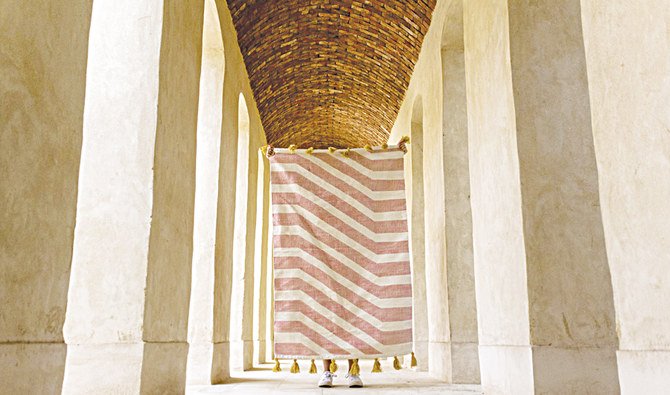
- ARAB NEWS
- 08 May 2024

Triska Hamid
CAIRO: When Ibrahim Shams and his graphic designer wife Noha El-Taher were decorating their baby daughter’s room, they wanted to add a traditional touch, a kilim rug.
But the ones available were outdated in their designs and mostly made in China using cheap fabrics.
Spotting a gap in the market for a traditional craft suited to the modern palate, the pair decided to start their own business: Kiliim, a social enterprise and lifestyle brand to revive and sustain the local craft of the flat-weaving technique.
The origins of kilim are contested. Some claim it is a pharaonic craft, while others attribute it to the Ottoman Empire.
“There’s a small village in the Nile Delta, Fowwa, which was very, very famous for kilim,” said Shams. “With the decline in tourism, the industry began to fade.”
The pair started traveling to Fowwa and meeting with weavers, and settled on one workshop that had the most “positive” people.
“Everyone was very negative about the craft, saying that 10-15 years from now, there would be no weavers left,” said Shams.
Kiliim was launched in 2016 with four weavers who were all born and raised in the village and had inherited the craft from their fathers and grandfathers.
Kiliim partners with the craftsmen, rather than hiring them as employees. Each weaver is paid for what they produce, with the workshop owned by the chief craftsman.
A year after launching, Kiliim won the social enterprise track at the MIT Arab Start-up Competition, taking home $50,000.
Back in 2003, there were some 2,000 kilim weavers. Now there are fewer than 300, according to Shams. Much of the weavers’ livelihood depended on tourism.
At its peak, Egypt’s tourism sector accounted for 11 percent of its gross domestic product in 2010, prior to the Jan. 25 revolution in 2011. But with the unrest that followed, the number of tourists swiftly declined.
“They usually sold them (kilims) to touristic areas in Sharm El-Sheikh and Hurghada as souvenirs that symbolize the country and heritage of Egypt,” said Shams.
“We saw another opportunity that the weavers had missed — the designs, the materials and the overall finished product weren’t trendy anymore,” he added.
“They knew a certain pattern and style, and it was the lack of innovation and the recession that led to their decline.”
With her background in design, El-Taher used her skills to create new patterns and better branding for the trade and the village. The weavers were a little reluctant at first with the new designs, but eventually came around.
“In the beginning everything was a little tough. Everything was funded form our own savings,” said Shams.
“It was very, very tough in the beginning. It’s an online business, but many people like to come and try out the rug and see it physically, so that was challenge in the very beginning.”
There was a reluctance to buy the rug before seeing it in person, so the couple began to offer a free home trial service.
“They can select from different designs, and we send them to their house and see which one fits best,” said Shams.
This led to an 80 percent conversion rate from trial to purchase, and cut out the need for a physical store in the first few years.
They plan to open their first brick-and-mortar store in the first quarter of 2020. Plans to digitize the trial experience by offering a virtual simulator are also in the works.
“We also want to start a school to teach the craft to those who want to learn, followed by an internship program to shadow the weavers with an opportunity to the join the team,” said Shams.
This report is being published by Arab News as a partner of the Middle East Exchange, which was launched by the Mohammed bin Rashid Al Maktoum Global Initiatives and the Bill and Melinda Gates Foundation to reflect the vision of the UAE prime minister and ruler of Dubai to explore the possibility of changing the status of the Arab region.